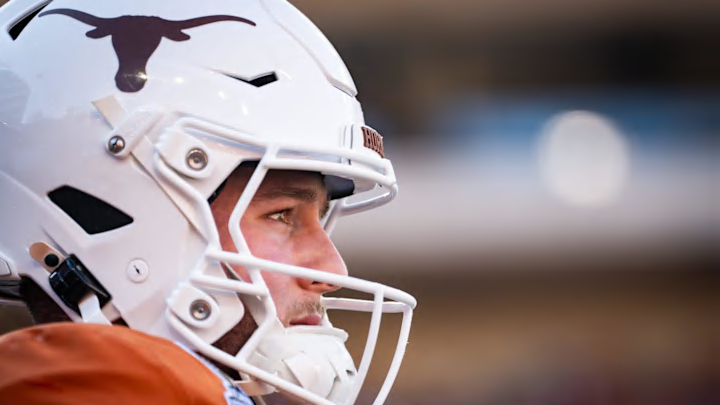Quinn Ewers Comes Full Circle Leading Texas Against Ohio State in CFP Semifinals

Football in the state of Texas, no matter the level, is not something limited by the calendar nor dictated by the season.
It is an all-day, everyday sport whether you are chatting about a coaching decision at a barbershop in West Texas or debating friends about recruiting decisions at one of the many mega-malls that pocket the four sprawling metropolises further east.
Of all the literal and figurative symbols that embody this singular focus across the region, AT&T Stadium easily stands out as one of the most recognizable.
It is the home of the most popular team in the Lone Star State and beyond, the Dallas Cowboys. The natural curvature of the $1.3 billion Taj Mahal of the gridiron is even subtly shaped like a football. As the longtime host of the high school state championship games, it is often regarded as the ultimate destination from pretty much the moment they start playing.
It is also the regular host to the Cotton Bowl, which this year doubles as a College Football Playoff semifinal between the Texas Longhorns and Ohio State Buckeyes. Taking center stage at the venue is someone who is no stranger to Friday night lights, the place colloquially known as “Jerry World” or even the opponent.
Longhorns quarterback Quinn Ewers grew up in nearby Southlake, Texas, played his final high school game at the stadium and, in a notable full-circle moment, will play for a spot in the national title game against the team he was a part of as a freshman.
“I felt like I belonged there. It’s going to be fun to get to see those guys,” Ewers said. “Me and [Ohio State defensive end] Jack Sawyer were roommates my freshman year with a couple other guys, so it’s going to be cool to get to see those guys, for sure.”
While there can be some animosity when a player leaves a program, that is far from the case here. It has worked out for both parties as each found success in their own way.
Ohio State got plenty of production out of starting quarterback C.J. Stroud, boosted a celebrated recruiting class with another five-star and won lots of games that led to a pair of CFP runs. Ewers, meanwhile, got to learn from one of the best quarterback developers at the college level, cashed in on plenty of NIL deals and is now one of the biggest reasons why Texas has made back-to-back playoff semifinals.
“He was one of the first eighth graders that I ever offered. He was in our camp in the Woody [Hayes Athletic Center] and I saw a young boy at the time, really, who just had a tremendous release,” Buckeyes coach Ryan Day said. “I remember grabbing him and grabbing his dad and said, ‘Man, you got a bright future ahead of you. I don’t know if this is good or bad, but we’re going to offer you a scholarship to Ohio State, even in eighth grade.’ Again, I don’t know if that’s legal or not, but we did. And then we went through the process. And boy, it was strange how it all shook out.”
That’s one way to describe things as the hoopla around Ewers’s decision to join the Buckeyes was enough to fill a new Buzz Bissinger novel.
To start with, you could take the fabled recruiting status of the young quarterback. Ewers was highly touted even before he took a snap at powerhouse Carroll High School and on the radar of plenty of college coaches coming out of middle school. When recruiting sites first ranked him as part of the Class of 2022, he was a consensus five-star and the top overall player. Some even gave him a fabled perfect prospect grade.
It was right around this time NIL was becoming a much bigger factor in college athletics and at the high school level. Young prep stars were signing endorsement deals with a select few earning more than their peers who were taking classes at universities.
More interestingly was the response from state legislatures. Some sensed opportunities and fast-tracked new laws to open NIL to athletes in their state, while others took a different approach. Texas, surprisingly, voted against high school athletes taking advantage of NIL opportunities.
That put Ewers between a rock and a hard place. He had just wrapped up his junior season, battling through injuries to reach the state title game and endured plenty of speculation after decommitting from his longtime pledge to attend Texas (the staff, including head coach Tom Herman, were eventually fired in part because of the decision). As the top player in the country, he was also being offered and wooed with a number of NIL deals—most famously with a local kombucha company.
Late in the summer, Ewers decided to skip his senior year and reclassify to the 2021 recruiting class. And he headed to Ohio State after the program’s preseason activities were already underway.
“Definitely had to grow up super fast. As you know, fall camp is not easy, and going from a high school schedule to where you’re practicing after school, to practicing before school, and for me to kind of go in in the middle of fall camp and practice at a college level was definitely a shock, for sure,” Ewers said. “Learned a lot while I was there under Coach Day and CJ [Stroud], and just that whole room was awesome to be around. Super thankful for that time that I got to spend there.”
Ewers was behind the eight ball from the start and never could make much headway. Stroud quickly earned the job and became a Heisman Trophy finalist that season. Kyle McCord got the nod as the primary backup, and even third-stringer Jack Miller III seemed more accustomed to the offensive system with his additional time on campus.
Ewers may have technically been the highest-rated recruit ever to join the Buckeyes, but he wound up redshirting and saw just two snaps in a blowout of the Michigan State Spartans that season.
“I don’t regret any decision I’ve made on going or anything like that, but the main reason I went was I felt like I had a great relationship with the coaching staff. And they were winning a lot of games, and I wanted to go be a part of something like that,” Ewers said. “And the reason that I came back to Texas was, one, to be closer to where I’m from and just closer to the resources that I have and the relationships that I’ve built over time just being from Texas.”
While the path to the starting job was undoubtedly clearer in Austin, there was no shortage of things pulling him back to his home state. He knew the program well from plenty of unofficial visits and grew up a Longhorns fan. There was a new coaching staff, led by noted play-caller and quarterback developer Steve Sarkisian, plus a looming move to the SEC.
It wound up being a perfect marriage, albeit a year delayed, between the quarterback Texas always wanted and the player who always wanted to don the burnt orange.
Though injuries have occasionally limited his time on the field, Ewers has lived up to the billing and restored the program to the national stage after years of middling results. He led back-to-back 12-plus-win campaigns for the first time since 2008–09 and made the conference championship game twice in his two years as a starter.
Last season, that included holding up a WWE belt and getting showered by orange and white confetti as he won the Big 12 title over the Oklahoma State Cowboys in the Longhorns’ last year in the league. Playing at the familiar AT&T Stadium where he once committed a slew of turnovers to lose his last game in high school, Ewers put together his best game at Texas—452 yards, four touchdowns, one pick—to lock up its first College Football Playoff bid.
“When he went to Ohio State early on, he should have still been a senior in high school. And when we got him back, he was still, in our eyes, a freshman at that time,” Sarkisian said. “So there’s been a lot of development, I would say physical development, but I would also say probably mental and emotional development.
“To be at his best when his best was needed, similar to the Peach Bowl there at the end of the game and in overtime—I think that’s all from a seismic shift from a maturity standpoint, physically and mentally.”
Much like against the Clemson Tigers in their first-round game, Ewers helped the Longhorns to an early lead that included a 14-point outburst in the first quarter. But they stopped converting third downs, the run game put an extra burden on the quarterback’s shoulders and the double-digit lead kept slipping away. Texas looked, well, toast at the hands of Cam Skattebo and the upstart Arizona State Sun Devils.
“He’s the one that leads us, gets the play going. Just to see him calm definitely calms our nerves a little bit,” tight end Gunnar Helm said of Ewers. “If things are good, he keeps us in a good headspace. If things might not be going too good, like going three-and-out, he keeps us in a good headspace, just keeps encouraging us.
“Every time I would be pretty shell-shocked as a quarterback, thinking back in it, he’s been the most level-headed that there is on the field.”
Case in point came at the end of the Peach Bowl, where potential disaster was averted thanks to some quick thinking in the backfield. Facing a fourth-and-13 at the end of the first overtime, Ewers recognized Arizona State was applying significant pressure. He quickly adjusted the blocking up front and calmly lofted a 28-yard touchdown strike into the waiting hands of Matthew Golden.
Just one play later in the second overtime, he found Helm for a touchdown and converted to Golden on the two-point conversion for the 39–31 win that booked the team’s ticket to the semifinals.
“I was about ready to turn around and tell Quinn to hold up. But he saw it just in time,” center Jake Majors said. “Total experienced veteran play from Quinn just to recognize all the tips and traits of a Cover Zero blitz and to get us in the right protection to be able to convert on that fourth down. You guys may never see it. It may seem like a routine play. But to us, that’s Quinn doing his job, being a veteran quarterback and leading his team by executing at a high level.”
This is Ewers’s team. It’s his moment. Texas is back, better and being led by the quarterback who always believed in reaching this stage with the program.
“With college football, you look to adapt the best you can,” Day said. “[Ewers] decided he really wanted to play. It was disappointing for us, but we certainly understood. And from afar, I’ve watched him and he’s got a lot of talent. He’s a really good player. He comes from a great family and he’s had a great career at Texas. A lot of people here still have good relationships with him and think the world of him.”
That may be the case for Ohio State and its head coach—right up until kickoff on Friday night, when all bets are off on a full-circle story set to write one more chapter deep in the heart of football-mad Texas.
